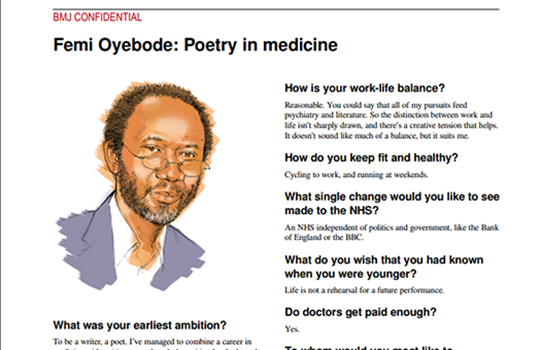 The sheer breadth of doctors’ talents and abilities shone out from the pages of BMJ Confidential this year. We had doctors who were poets, masterchefs, novelists, comedians, actors and singers.
The sheer breadth of doctors’ talents and abilities shone out from the pages of BMJ Confidential this year. We had doctors who were poets, masterchefs, novelists, comedians, actors and singers.
One of the themes this year has been doctors “coming out.” Comedian and former junior doctor Adam Kay said that his mother cried when he “came out” as gay, and also when he left medicine, while sleep expert Michael Farquhar says in his column, being published in January, that he wished he realised earlier that “that coming out wouldn’t end my world, it would start it over again.”
Joanna Poulton, professor of mitochondrial genetics at Oxford, “came out” in her BMJ Confidential column– not as gay but as suffering from ADHD, which she said has interfered with grant applications and papers. She was pleased to discover it responded well to medication.
What would they be doing, if not in their present jobs: rescuing stray kittens, cycling in the Tour de France, playing in a band. One doctor said that from watching reality police programmes, he thought there was a gap in the market for a “reasonably intelligent, methodical criminal.”
Many doctors showed “rat-like cunning” in practising medicine and ensuring patient safety. John Launer, a doctor and writer, revealed that when he was a junior, he and his colleagues hid some of their patients on side wards to save them from being treated by a particularly irrational consultant.
One of the most distinguished doctors we interviewed was Ray Dolan, professor of neuropsychiatry at University College London, who this year shared the one million euro Brain Prize, awarded annually by the Lundbeck Foundation for outstanding contributions to neuroscience. He likes being an academic because it helps him avoid “having to answer to unimaginative managerial types, who seem to flourish in today’s NHS.”
If he were given £1m, Dolan would use it to expose “fake news and outright propaganda in relation to health funding, particularly mental health funding.”
Different ways of keeping fit for our doctors include: taking a brisk walk to the pub; and “thinking about exercise, and then lying down until the thought passed.”
Favourite books were Being Mortal by Atul Gawande, Do No Harm by Henry Marsh, and Thinking, Fast and Slow by Daniel Kahneman. Public health doctor Mary Black was annoyed that interviewees always seemed to choose male writers, so made a special point of nominating The Immortal Life of Henrietta Lacks by science writer Rebecca Skloot.
What do people wear to work? Comedian Adam Kay said:“Boxer shorts in summer, and a dressing gown in winter—but it is worth pointing out that I work at home.” And when we asked John Launer, he said: “Clothes, except in dreams.”
Several doctors confessed to suffering from “imposter syndrome,” the feeling that they did not deserve to be in their current position—but this seemed to get better as people got older.
Three themes recurred when we asked about what doctors wanted for the NHS: parity of esteem between mental and physical healthcare, end of the purchaser/provider split, and an end to creeping privatisation.
Poet and professor of psychiatry Femi Oyebode was one of the most outspoken interviewees on the problems in the NHS. When asked for his pet hate, he said: “Jeremy Hunt, for taking pride in defeating junior doctors and demoralising young doctors. And for the not so surreptitious chronic underfunding of the NHS, which is likely to lead to the collapse of the greatest social invention of the 20th century.”
Annabel Ferriman, associate editor, The BMJ
